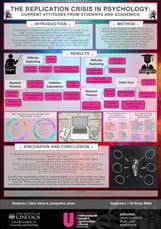by Alice Gains & Jacqueline Jones (UROS 2019 People’s Choice Runner-Up) //

 Our UROS project was a fascinating journey that allowed us to explore the ‘replication crisis’. This topic has limited investigation and is argued to be an ever-growing concern within psychology.
Our UROS project was a fascinating journey that allowed us to explore the ‘replication crisis’. This topic has limited investigation and is argued to be an ever-growing concern within psychology.
We wanted to take the time to investigate attitudes towards the apparent ‘crisis’ from students and staff at the University of Lincoln, within the School of Psychology. To do this, we created an online Qualtrics questionnaire surrounding three main areas; ‘defining replication crisis’, ‘research activity and awareness’ and ‘problems and solutions to the crisis. Our UROS poster presents aspects of the ways in which participants define replication.
Our research sheds light on the reasons behind the crisis and allowed participants to consider possible solutions to protect public and academic trust in Psychology. Our findings suggest there is a moderate amount of awareness about the replication crisis here at the University of Lincoln, but personal definitions and rating of published definitions vary greatly. A spotlight was put on the need to teach the replication crisis earlier at university and the need for openness and transparency when approaching research.
In reflection, taking part in UROS has been an extremely positive experience. As this was a joint project, we have improved our team working skills but also strengthened our ability to evenly share workloads. Additionally, our organisational skills have become stronger by aspiring to meet personal and external deadlines at various stages of the project. Moreover, the UROS scheme has prepared us for what to expect the dissertation process to be like as we go into our final year of our degrees. Now we are looking to further research the replication crisis with the possibility of conducting focus groups, presenting our research at conferences and potentially publishing our findings.
Although, the project was faced with various challenges. For example, there were delays in starting the data collection as we waited to obtain ethical approval. This resulted in difficulty to recruit participants over the summer period as we initially planned to collect student data while they were still timetabled on campus. To overcome this, we advertised our study on social media and Blackboard, and successfully obtained enough responses that allowed us to meet the project aims. We do however have plans on continuing the research beyond UROS in hopes of getting an even more representative sample. The insights we gained from academics and students about the process of psychological research suggests that topics including the replication crisis should be focused on within psychology classes here at the university.
To anyone considering being involved with UROS in the future, we would recommend creating a proposal to send to willing academics to gain advice and insight before approaching potential supervisors. We would also recommend submitting ethics as soon as possible to kick start data collection!
Finally, we would like to acknowledge the work of the UROS team for their help and advice throughout the summer. We would also like to thank our supervisor, Dr. Kirsty Miller, for her continuous support and guidance on this project.
*To view Alice & Jacqueline’s project poster, please click on the thumbnail below:

